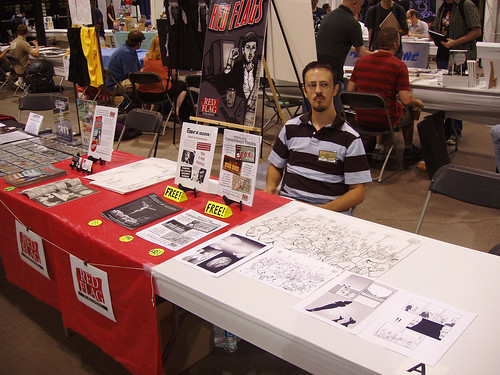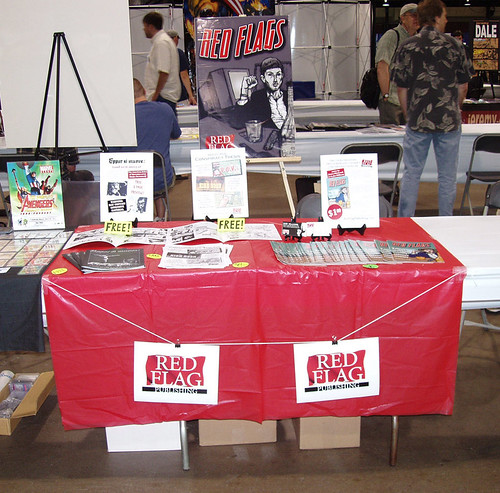In my last post I started what is basically a series detailing my attempt to get work in comics. In that post I explained how James Hitchcock and I came to self-publish an anthology comic called "Red Flags" and assemble a second volume which we are attempting to find a publisher for (
read it for free right now). In trying to keep that post from being an entire novel I sort of shorted some things I felt merited a little more discussion. What follows is an attempt to explain why we started self publishing in the first place...
Besides an earlier aborted effort,
Red Flag Publishing only got started when I told Jim about
a contest being held by Viper Comics. The company was asking for a 5-page backup story that would run in one of their crime/detective books so they were looking for something in the crime, detective or horror genres. I told Jim about it since we'd been discussing how to take a stab at comics and he agreed it sounded like something we should try.
That aborted, earlier project I referred to was a sort of Sin City graphic novel series Jim had created which he'd tried to get me to draw when we first met about 10 years ago. I've never been much into the detective genre while it's one of Jim's favorites. My interest waned (partially due to not caring much for drawing office interiors and other mundane things and also the fact that Jim was turning in page after page of script and by the time I got drawing he had probably hundreds of pages of script and I just felt a little over-whelmed when most of my life I haven't been able to draw comics of more than one page in length very often) and nothing ever came of it. Several years having passed, I now felt I was ready to actually finish some comics since I could now clearly see my life passing (hitting 30 and having a kid will do that to you) and I figured it was now or never. That 5-page story seemed like something I could actually complete.

Jim nearly instantly turned in the script for
Mr. Smith. It felt right. It was a noir piece (Jim's specialty) that was also magical realism (more to my liking). He'd found a way to combine his peanut butter and my chocolate. It was a very down-beat story which probably reflected his grim thinking in the days when his marriage was crumbling. In fact, the thing that really got me set on drawing comics was realizing how good of a writer Jim was and wanting to help show other people as he was stuck editing copy for a shopping guide where the most creative he could get is in his yearly attempt to sneak in a funny headline when they hold the annual "Magic Get-Together" in Colon, Michigan ("Magicians Descend on Colon" is still my favorite).
We didn't win, but we did learn a couple quick lessons. First, the company failed to announce the winner when they said they would. It was the first of many signs that comics companies don't operate by the sale rules as most other companies (it doesn't help that people aren't exactly making millions printing and selling comic books so it's not like they have massive editorial departments). Jim and I both work in the newspaper business where you simply don't get an opportunity to blow a deadline. Being one hour late could cost the companies hundreds or thousands of dollars and we have a constant stream of jobs due that all have to fit in their alloted time on the press- being late isn't an option (even if it's "just" announcing the winner of a contest). However, in a field where books routinely ship weeks late, sometimes months and even years, this behavior seems sadly commonplace and typical. In fact, if a company is merely late then they're usually doing well by industry standards in an arena filled with shysters and sociopaths who routinely start up fly by night operations that scam consumers and creators, make quick cash and then disappear only to show up again years later to take advantage of a whole new crop of people.
When
the winner was announced, one sore loser trolled the message board bad mouthing the winning entry, the editor and the company. While I obviously felt we'd created something good and the winning entry wasn't exactly my cup of tea (mostly, I felt it didn't really fit the book it was going into, while it had a very cool Dave Cooper meets Jhonen Vasquez feel, the scraggly humor-based goth art style and cuddly characters didn't exactly sit comfortably next to the main series as I saw it but it wasn't my choice to make I wouldn't dream of bad mouthing a person for simply choosing what he thought was the better choice), I could see how the artist had a lot going for him with an attractive art style solid storytelling.
If only I'd been able to match the darkness of the script
maybe we'd have won. But I still have a way to go in building up my confidence in drawing comics, I can see that my lack of confidence expresses itself in the lack of boldness in the art itself- both in terms of pushing the drawing and also in the spotting of blacks. I'm so afraid to make a mistake that I'm scared to lay down the blacks, seemingly unable to commit and risk making a mistake. Still working on that though I can see how with each new page it gets better.
So, now we had 5 pages of comics that, despite losing the contest, didn't seem half bad. We'd already been discussing an idea which was starting to form into something and the annual convention in Chicago was coming up. Jim started writing script pages for what would become the fist chapter of "Snatched," a thriller about a series of child abduction and the FBI agent and reporter who slowly find out the truth.

I sent out a handful of book to reviewers and it got some nice feedback:
"For their first steps into the world of comic books, James Hitchcock and Joe Willy show a great amount of promise; a strong grasp of story and an eye toward graphic pacing. Hopefully they will continue to hone their respective skills and continue to turn out creative stories." -
Tanya Crawford, Broken Frontier"...it's pretty good for someone just starting out. The stories hang together pretty well too: the first chapter of a kidnapping story with wider implications, and a vignette about a killer-by-assignment. Not bad for the price." -
Steven GrantThe main reason we ended up publishing the book was because we'd decided to hit the Chicago convention and wanted something to show other professionals, editors and publishers. Jim wouldn't be able to get anyone to read his scripts without having someone draw them and I was unlikely to get someone to take a chance on me, even if they liked my art, because I lacked proof that I could finish enough material to make a book. Artists in comics are notorious for flaking out and blowing deadline, a side effect from it being a very laborious and back-breaking endeavor which often reaps little reward, especially in a cost-benefit analysis.

So, we weren't really planning on even selling the book, simply throwing a $1 price on it just because our printer had given us a large enough break that it sounded like an easy decision to print 200 more for only about $50 extra. I've always had a hard time turning down "up selling" like when I bought my computer and an extra $100 gets you even more RAM and maybe aDVD burner it's kind of hard to turn down even when you don't really have it to spend- it seems foolish to not take advantage of such a good deal.
We even threw in a script page as a gag, since we saw it more as a business card we thought it would be cool to have an actual page of Jim's script with a fake "post it" note from him asking me to draw an extra scene despite the book being due at the printer the next day (which actually, is sort of what happened- Jim realized he needed an extra scene but by then we'd have blown the deadline and gone over our page count if I'd have actually drawn the new scene). Needless to say, most people haven't "gotten" the joke. It was yet another example of us being neither fish nor fowl- creating an ashcan/business card yet selling it to people as if it was a complete comic.
Another mistake was thinking we'd sell it for a buck and give people a deal since we knew we didn't really have a full and complete comic- one short story and a longer story which was the first chapter of a larger story which included one page of script- and anything more would leave people feeling cheated. Yet by only pricing it at a buck we disincentivized ourselves from working hard to sell it- when each sale nets you a mere .50¢, it's hard to make any money without selling lots of books. If a store only wants to take a handful on consignment are you really going to drive across town, let alone out of state, to pick up the money you made from those sales?
This leads into the many mistakes we've made along the way and lessons learned which is a good time to break this off and promise more later. Thanks for reading- more soon!





